 These cruisers own; they are so manly. For Pascha I am going to try to get a pair of these babies for my tender toosties. Batman shoes, good red wine, some aromatic pipe smoke and some meat and cheese: I will be giving up thanks to the Big Guy! Bring on Pascha, yes indeed! I look forward to digging out my hobbit pipe and playing a tune or two on her. How much longer until Pascha is it, again? Ah, time to dig deeply and live out life by grasping with my lenten hands :)
These cruisers own; they are so manly. For Pascha I am going to try to get a pair of these babies for my tender toosties. Batman shoes, good red wine, some aromatic pipe smoke and some meat and cheese: I will be giving up thanks to the Big Guy! Bring on Pascha, yes indeed! I look forward to digging out my hobbit pipe and playing a tune or two on her. How much longer until Pascha is it, again? Ah, time to dig deeply and live out life by grasping with my lenten hands :)
2006-03-28
Batman's chucks!
 These cruisers own; they are so manly. For Pascha I am going to try to get a pair of these babies for my tender toosties. Batman shoes, good red wine, some aromatic pipe smoke and some meat and cheese: I will be giving up thanks to the Big Guy! Bring on Pascha, yes indeed! I look forward to digging out my hobbit pipe and playing a tune or two on her. How much longer until Pascha is it, again? Ah, time to dig deeply and live out life by grasping with my lenten hands :)
These cruisers own; they are so manly. For Pascha I am going to try to get a pair of these babies for my tender toosties. Batman shoes, good red wine, some aromatic pipe smoke and some meat and cheese: I will be giving up thanks to the Big Guy! Bring on Pascha, yes indeed! I look forward to digging out my hobbit pipe and playing a tune or two on her. How much longer until Pascha is it, again? Ah, time to dig deeply and live out life by grasping with my lenten hands :)
2006-03-26
Jack Johnson and Curious George
 Somethings go together, like rapsberry jam and butter on sourdough toast. Other things don't fit so well, at least on the surface. I came across this latest offering from Jack Johnson while searching for some Ben Harper music. But it would be better to say, "I stumbled upon it;" because I did stumble spiritually by starting to think ill thoughts of Jack for working on this project in the first place. I mean seeing this soundtrack by Jack Johnson for this movie was much along the lines of running into Queen Elizabeth while at a strip joint or at the neighbourhood drug dealer's home: "...... excuse me, what are you doing here....moreover, why am I here?" Consider that even my children wouldn't want to see the movie for this soundtrack. And that shows good taste. Does anyone know whether this music is worth checking out? I like Jack Johnson's music, but I hesitate with this Curious George soundtrack. Let me know what you know in the comments.
Somethings go together, like rapsberry jam and butter on sourdough toast. Other things don't fit so well, at least on the surface. I came across this latest offering from Jack Johnson while searching for some Ben Harper music. But it would be better to say, "I stumbled upon it;" because I did stumble spiritually by starting to think ill thoughts of Jack for working on this project in the first place. I mean seeing this soundtrack by Jack Johnson for this movie was much along the lines of running into Queen Elizabeth while at a strip joint or at the neighbourhood drug dealer's home: "...... excuse me, what are you doing here....moreover, why am I here?" Consider that even my children wouldn't want to see the movie for this soundtrack. And that shows good taste. Does anyone know whether this music is worth checking out? I like Jack Johnson's music, but I hesitate with this Curious George soundtrack. Let me know what you know in the comments.
2006-03-23
Woe unto them that call evil good
Is. 5:20 reads like a sword of war against equivocation:
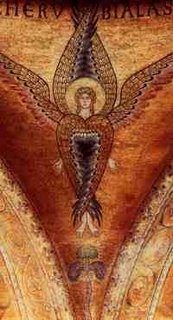
This reversal of values and equivocation continues in our time: . 'Woe unto them that call evil good,' but that is exactly what we have done. We have lost our spiritual focus and reversed our sense of what is virtuous:
We have exploited the poor and called it the lottery. We have rewarded laziness and called it welfare.
We have killed our unborn and called it choice. We have shot abortionists and called it justifiable. We have neglected to discipline our children and called it building self esteem. We have abused power and called it politics. We have coveted our neighbor's possessions and called it ambition. We have polluted the air with profanity and pornography and called it freedom of expression. We have ridiculed the time-honoured virtues of our forefathers and called it enlightenment.
Reading Isaiah is a good way to put a stop to the spiritual wickedness which is equivocation.
Washing clean the concepts we think with and the words we use to express our concepts with is necessary.
This is when it is wise to recall Christ's saying about "Yea and Nay".
In my En.11 classes we are studying Macbeth wherein this concept of equivocating is very important to understanding how Shakespeare uses the speech of the witches to characterize them as being evil. Hence, anyone who speak such-and-such a way, is that way as a person. Accordingly when we first meet Macbeth, he equivocates, saying, "So foul and fair a day I have not seen." As the story continues the equivocation takes on more serious consequences than merely suggesting there is no distinction between good and foul weather.
Woe unto them that call evil good, and good evil; that put darkness for light, and light for darkness; that put bitter for sweet, and sweet for bitter!

This reversal of values and equivocation continues in our time: . 'Woe unto them that call evil good,' but that is exactly what we have done. We have lost our spiritual focus and reversed our sense of what is virtuous:
We have exploited the poor and called it the lottery. We have rewarded laziness and called it welfare.
We have killed our unborn and called it choice. We have shot abortionists and called it justifiable. We have neglected to discipline our children and called it building self esteem. We have abused power and called it politics. We have coveted our neighbor's possessions and called it ambition. We have polluted the air with profanity and pornography and called it freedom of expression. We have ridiculed the time-honoured virtues of our forefathers and called it enlightenment.
Reading Isaiah is a good way to put a stop to the spiritual wickedness which is equivocation.
Washing clean the concepts we think with and the words we use to express our concepts with is necessary.
This is when it is wise to recall Christ's saying about "Yea and Nay".
2006-03-22
OpenBSD 3.9 on May 1st.
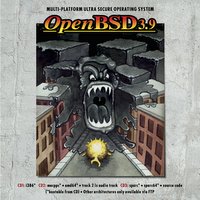
Pre-orders are up for 3.9, so you can all whip out your plastic and support the project. The artwork theme this time is a supremely cool "attack of the binary blob" with a nifty "Stop BLOB!" shirt, aimed against the increasing proliferation of vendor supplied unmaintainable inscrutable binary blob drivers. Wear yours with pride and stick your favourite assinine vendor logo on the back in the blob (now where is my nvidia swag?).
2006-03-21
To School on a Fire Engine
 luke and i and two of his friends took a ride to school today on this fire engine. it was cool; we were able to sound the siren, wear fire fighter helmuts, sit in the driver's seat and hang out with two of fort langley's finest fire fighters. when they dropped luke and his buddies off at school, the boys had had a good 30 minute tour. i enjoyed watching luke's face as they arrived at school, being the envy of most other young dudes. he and his friends were 'it' for a brief moment. but that's what happens when you get a lift to school on a fire engine!
luke and i and two of his friends took a ride to school today on this fire engine. it was cool; we were able to sound the siren, wear fire fighter helmuts, sit in the driver's seat and hang out with two of fort langley's finest fire fighters. when they dropped luke and his buddies off at school, the boys had had a good 30 minute tour. i enjoyed watching luke's face as they arrived at school, being the envy of most other young dudes. he and his friends were 'it' for a brief moment. but that's what happens when you get a lift to school on a fire engine!and me in all this? i was just a schmuck who had to walk home after being dropped off at my son's school :P
2006-03-17
St. Ephraim
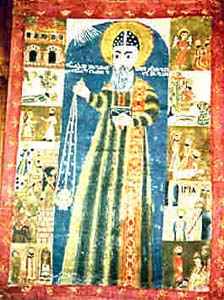
When it came time to name my son I suggested to my wife that one of his middle names be Ephraim, after a great Syrian saint. The name means 'fruitful' or 'prosperous' in its Hebrew etymology and I thought that was a very strong reason for giving my son this as one of his middle names. I am glad Ramone agreed, though her reasons were founded more on the great spiritual insight found in the Lenten prayer composed by St. Ephraim:
O God, cleanse me, a sinner.
O Lord and Master of my life,
take from me the spirit of laziness,
despair, lust for power and idle talk.
But rather the spirit of chastity, humility,
patience and love to your servant.
Yea, O Lord and King,
grant me to see my own sins
and not to judge my brother:
for you are blessed
unto the ages of ages.
O God, cleanse me, a sinner.
Amen.
My favourite line of Saint Ephraim's is from his second of nineteen Hymns on the Nativity of Christ in the Flesh, wherein he writes: "Blessed be the Fruit, Who lowered Himself to fulfill our hunger!" What literary critic would not be drop-jawed at that figure of speech?!
One of St. Ephraim's re-occurring figures of speech is that of Christ as painting a self-image. Speaking of the Jewish law, the Gospels, and nature, he wrote:
You have mixed them together as paints for
your portrait; you have looked at yourself,
and painted your own portrait.
Here is the painter, who in himself has painted
his Father's portrait,
two portrayed, the one in the other...
you in your coming brought it to completion.
Here are a couple photos of the church to which St. Ephraim devoted so much of his energy and a snippet from Wikipedia on St. Ephraim:
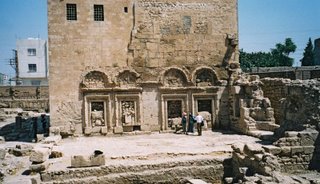
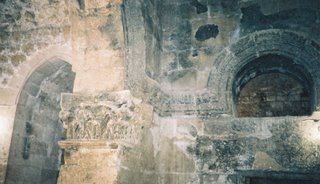
Ephraim was born around the year 306, in the city of Nisibis (the modern Turkish town of Nusaybin, on the border with Syria). Internal evidence from Ephraim's hymnody suggests that both his parents were part of the growing Christian community in the city, although later hagiographers wrote that his father was a pagan priest. Numerous languages were spoken in the Nisibis of Ephraim's day, mostly dialects of Aramaic. The Christian community used the Syriac dialect. Various pagan religions, Judaism and early Christian sects vied with one another for the hearts and minds of the populace. It was a time of great religious and political tension. The Roman Emperor, Diocletian had signed a treaty with his Persian counterpart, Nerses in 298 that transferred Nisibis into Roman hands. The savage persecution and martyrdom of Christians under Diocletian were an important part of Nisibene church heritage as Ephrem grew up.
Jacob, the first bishop of Nisibis was appointed in 308, and Ephraim grew up under his leadership of the community. Jacob of Nisibis is recorded as a signatory at the First Council of Nicea in 325. Ephraim was baptized as a youth, and almost certainly became a son of the covenant, an unusual form of Syrian proto-monasticism. Jacob appointed Ephraim as a teacher (Syriac malp̄ānâ, a title that still carries great respect for Syriac Christians). He was ordained as a deacon either at his baptism or later. He began to compose hymns and write biblical commentaries as part of his educational office. In his hymns, he sometimes refers to himself as a 'herdsman' (`allānâ), to his bishop as the 'shepherd' (rā`yâ) and his community as a 'fold' (dayrâ). Ephraim is popularly credited as the founder of the School of Nisibis, which in later centuries was the centre of learning of the Church of the East.
In 337, Emperor Constantine I, who had legalised and promoted the practice of Christianity in the Roman Empire, died. Seizing on this opportunity, Shapur II of Persia began a series of attacks into Roman North Mesopotamia. Nisibis was besieged in 338, 346 and 350. During the first siege, Ephraim credits Bishop Jacob as defending the city with his prayers. Ephraim's beloved bishop died soon after the event, and Babu led the church through the turbulent times of border skirmishes. In the third siege, of 350, Shapur rerouted the River Mygdonius to undermine the walls of Nisibis. The Nisibenes quickly repaired the walls while the Persian elephant cavalry became bogged down in the wet ground. Ephraim celebrated what he saw as the miraculous salvation of the city in a hymn which portrayed Nisibis as being like Noah's Ark, floating to safety on the flood.
One important physical link to Ephraim's lifetime is the baptistery of Nisibis. The inscription tells that it was constructed under Bishop Vologeses in 359. That was the year that Shapur began to harry the region once again. The cities around Nisibis were destroyed one by one, and their citizens killed or deported. The Roman Empire was preoccupied in the west, and Constantius and Julian, struggled for overall control. Eventually, with Constantius dead, Julian the Apostate began his march into Mesopotamia. He brought with him his increasingly stringent persecutions of Christians. Julian began a foolhardy march against the Persian capital, Ctesiphon, where, overstretched and outnumbered, he was forced into an immediate retreat back along the same road. Julian was killed defending his retreat, and the army elected Jovian as the new emperor. Unlike his predecessor, Jovian was a Nicene Christian. He was forced by circumstances to ask for terms from Shapur, and conceded Nisibis to Persia, with the provision that the city's Christian community would leave. Bishop Abraham, the successor to Vologeses, led his people into exile.
Ephraim found himself among a large group of refugees that fled west, first to Amida (Diyarbakır), and eventually settling in Edessa (modern Şanlıurfa) in 363. Ephraim, in his late fifties, applied himself to ministry in his new church, and seems to have continued his work as a teacher, perhaps in the School of Edessa. Edessa had always been at the heart of the Syriac-speaking world and the city was full of rival philosophies and religions. Ephraim comments that Orthodox Nicene Christians were simply called 'Palutians' in Edessa, after a former bishop. Arians, Marcionites, Manichees, Bardaisanites and various Gnostic sects proclaimed themselves as the true church. In this confusion, Ephraim wrote a great number of hymns defending Nicene Orthodoxy. A later Syriac writer, Jacob of Serugh, wrote that Ephraim rehearsed all-female choirs to sing his hymns set to Syriac folk tunes in the forum of Edessa. After a ten-year residency in Edessa, in his sixties, Ephraim succumbed to the plague as he ministered to its victims. The most reliable date for his death is 9 June 373.
2006-03-13
OpenBSD info & link

If you were ever curious about the operating system I have sometimes posted
about or alluded to by mentioning 'Puffy', then just check out this short interview. It is in .avi format.
2006-03-10
In memory of Simone Weil
While reading this poem Simone Weil had the experience of the presence of Christ. I hope that in reading "Love" by George Herbert, you might get at least a sense of what Simone Weil experienced.
Love
Love bade me welcome, yet my soul drew back,
Guilty of dust and sin.
But quick-ey'd Love, observing me grow slack
From my first entrance in,
Drew nearer to me, sweetly questioning
If I lack'd anything.
"A guest," I answer'd, "worthy to be here";
Love said, "You shall be he."
"I, the unkind, the ungrateful? ah my dear,
I cannot look on thee."
Love took my hand and smiling did reply,
"Who made the eyes but I?"
"Truth, Lord, but I have marr'd them; let my shame
Go where it doth deserve."
"And know you not," says Love, "who bore the blame?"
"My dear, then I will serve."
"You must sit down," says Love, "and taste my meat."
So I did sit and eat.
Love
Love bade me welcome, yet my soul drew back,
Guilty of dust and sin.
But quick-ey'd Love, observing me grow slack
From my first entrance in,
Drew nearer to me, sweetly questioning
If I lack'd anything.
"A guest," I answer'd, "worthy to be here";
Love said, "You shall be he."
"I, the unkind, the ungrateful? ah my dear,
I cannot look on thee."
Love took my hand and smiling did reply,
"Who made the eyes but I?"
"Truth, Lord, but I have marr'd them; let my shame
Go where it doth deserve."
"And know you not," says Love, "who bore the blame?"
"My dear, then I will serve."
"You must sit down," says Love, "and taste my meat."
So I did sit and eat.
2006-03-09
Beginning....a puzzle.
A man went searching for the beginning of the road he was traveling. He traced his footsteps back the way he had come, until he came to where he started. But the beginning of the road was not a beginning. Something lay on the far side of the road's beginning, a beginning before the beginning. And the road had no sooner begun than the beginning was over, and the road itself appeared.
There was a man who sought a spring. He wanted to locate a spring that was nothing but a spring, not a spring that had a stream of water flowing from it from it. No matter where he searched, he found only springs with streams. He could not find a pure spring, a spring uncorrupted by a supplemental flow of water.
He went home in despair, and on his way met the man looking for the beginning of the road. They found a roadside tavern, and went in for a pint.
There was a man who sought a spring. He wanted to locate a spring that was nothing but a spring, not a spring that had a stream of water flowing from it from it. No matter where he searched, he found only springs with streams. He could not find a pure spring, a spring uncorrupted by a supplemental flow of water.
He went home in despair, and on his way met the man looking for the beginning of the road. They found a roadside tavern, and went in for a pint.
...do battle against him...
The self-evidencing power of truth.
The word of truth is free, and carries its own authority, disdaining to fall under any skilful argument, or to endure the logical scrutiny of its hearers. But it would be believed for its own nobility, and for the confidence due to Him who sends it. Now the word of truth is sent from God; wherefore the freedom claimed by the truth is not arrogant. For being sent with authority, it were not fit that it should be required to produce proof of what is said; since neither is there any proof beyond itself, which is God. For every proof is more powerful and trustworthy than that which it proves; since what is disbelieved, until proof is produced, gets credit when such proof is produced, and is recognised as being what it was stated to be. But nothing is either more powerful or more trustworthy than the truth; so that he who requires proof of this is like one who wishes it demonstrated why the things that appear to the senses do appear. For the test of those things which are received through the reason, is sense; but of sense itself there is no test beyond itself. As then we bring those things which reason hunts after, to sense, and by it judge what kind of things they are, whether the things spoken be true or false, and then sit in judgment no longer, giving full credit to its decision; so also we refer all that is said regarding men and the world to the truth, and by it judge whether it be worthless or no.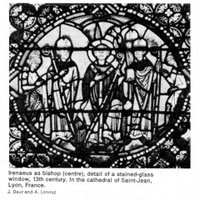 But the utterances of truth we judge by no separate test, giving full credit to itself. And God, the Father of the universe, who is the perfect intelligence, is the truth. And the Word, being His Son, came to us, having put on flesh, revealing both Himself and the Father, giving to us in Himself resurrection from the dead, and eternal life afterwards. And this is Jesus Christ, our Saviour and Lord. He, therefore, is Himself both the faith and the proof of Himself and of all things. Wherefore those who follow Him, and know Him, having faith in Him as their proof, shall rest in Him. But since the adversary does not cease to resist many, and uses many and divers arts to ensnare them, that he may seduce the faithful from their faith, and that he may prevent the faithless from believing, it seems to me necessary that we also, being armed with the invulnerable doctrines of the faith, do battle against him in behalf of the weak.
But the utterances of truth we judge by no separate test, giving full credit to itself. And God, the Father of the universe, who is the perfect intelligence, is the truth. And the Word, being His Son, came to us, having put on flesh, revealing both Himself and the Father, giving to us in Himself resurrection from the dead, and eternal life afterwards. And this is Jesus Christ, our Saviour and Lord. He, therefore, is Himself both the faith and the proof of Himself and of all things. Wherefore those who follow Him, and know Him, having faith in Him as their proof, shall rest in Him. But since the adversary does not cease to resist many, and uses many and divers arts to ensnare them, that he may seduce the faithful from their faith, and that he may prevent the faithless from believing, it seems to me necessary that we also, being armed with the invulnerable doctrines of the faith, do battle against him in behalf of the weak.
There is nothing like St. Irenæus to get me more firmly behind the Lenten discipline; I hope his manly logic lifted your spirits a bit.
The word of truth is free, and carries its own authority, disdaining to fall under any skilful argument, or to endure the logical scrutiny of its hearers. But it would be believed for its own nobility, and for the confidence due to Him who sends it. Now the word of truth is sent from God; wherefore the freedom claimed by the truth is not arrogant. For being sent with authority, it were not fit that it should be required to produce proof of what is said; since neither is there any proof beyond itself, which is God. For every proof is more powerful and trustworthy than that which it proves; since what is disbelieved, until proof is produced, gets credit when such proof is produced, and is recognised as being what it was stated to be. But nothing is either more powerful or more trustworthy than the truth; so that he who requires proof of this is like one who wishes it demonstrated why the things that appear to the senses do appear. For the test of those things which are received through the reason, is sense; but of sense itself there is no test beyond itself. As then we bring those things which reason hunts after, to sense, and by it judge what kind of things they are, whether the things spoken be true or false, and then sit in judgment no longer, giving full credit to its decision; so also we refer all that is said regarding men and the world to the truth, and by it judge whether it be worthless or no.
 But the utterances of truth we judge by no separate test, giving full credit to itself. And God, the Father of the universe, who is the perfect intelligence, is the truth. And the Word, being His Son, came to us, having put on flesh, revealing both Himself and the Father, giving to us in Himself resurrection from the dead, and eternal life afterwards. And this is Jesus Christ, our Saviour and Lord. He, therefore, is Himself both the faith and the proof of Himself and of all things. Wherefore those who follow Him, and know Him, having faith in Him as their proof, shall rest in Him. But since the adversary does not cease to resist many, and uses many and divers arts to ensnare them, that he may seduce the faithful from their faith, and that he may prevent the faithless from believing, it seems to me necessary that we also, being armed with the invulnerable doctrines of the faith, do battle against him in behalf of the weak.
But the utterances of truth we judge by no separate test, giving full credit to itself. And God, the Father of the universe, who is the perfect intelligence, is the truth. And the Word, being His Son, came to us, having put on flesh, revealing both Himself and the Father, giving to us in Himself resurrection from the dead, and eternal life afterwards. And this is Jesus Christ, our Saviour and Lord. He, therefore, is Himself both the faith and the proof of Himself and of all things. Wherefore those who follow Him, and know Him, having faith in Him as their proof, shall rest in Him. But since the adversary does not cease to resist many, and uses many and divers arts to ensnare them, that he may seduce the faithful from their faith, and that he may prevent the faithless from believing, it seems to me necessary that we also, being armed with the invulnerable doctrines of the faith, do battle against him in behalf of the weak.There is nothing like St. Irenæus to get me more firmly behind the Lenten discipline; I hope his manly logic lifted your spirits a bit.
2006-03-02
Epistle of Mathetes to Diognetus
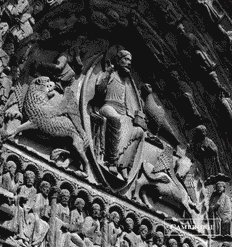
This epistle admirably illustrates the temper taught by St. Paul (2 Tim. ii. 24), and not less the peculiar social relations of converts to the Gospel. Mathetes was possibly a catechumen of St. Paul or of one of the apostles. Many scholars think that his correspondent, Diognetus, was the tutor of M. Aurelius. The author names himself as Mathetes, but no one can say more of his identity. What interests me is the description he gives of early Church communities. Do you think Mathetes is describing the communities in an ideal or realistic manner? I am inclined to think 'both' for my answer. Read this excerpt and decide for yourself:
For the Christians are distinguished from other men neither by country, nor language, nor the customs which they observe. For they neither inhabit cities of their own, nor employ a peculiar form of speech, nor lead a lifewhich is marked out by any singularity. The course of conduct which they follow has not been devised by any speculation or deliberation of inquisitive men; nor do they, like some, proclaim themselves the advocates of any merely human doctrines.But, inhabiting Greek as well as barbarian cities, according as the lot of each of them has determined, and following the customs of the natives in respect to clothing, food, and the rest of their ordinary conduct, they display to us their wonderful and confessedly striking method of life. They dwell in their own countries, but simply as sojourners. As citizens, they share in all things with others, and yet endure all things as if foreigners. Every foreign land is to them as their native country, and every land of their birth as a land of strangers. They marry, as do all others; they beget children; but they do not destroy their offspring. They have a common table, but not a common bed. They are in the flesh, but they do not live after the flesh. They pass their days on earth, but they are citizens of heaven. They obey the prescribed laws, and at the same time surpass the laws by their lives. They love all men, and are persecuted by all. They are unknown and condemned; they are put to death, and restored to life. They are poor, yet make many rich; they are in lack of all things, and yet abound in all; they are dishonoured, and yet in their very dishonour are glorified. They are evil spoken of, and yet are justified; they are reviled, and bless; they are insulted, and repay the insult with honour; they do good, yet are punished as evil-doers. When punished, they rejoice as if quickened into life; they are assailed by the Jews as foreigners, and are persecuted by the Greeks; yet those who hate them are unable to assign any reason for their hatred.
So we read about surpassing the legal expectations of the secular laws; not destroying our babies; not condoning adultery. These three stand out as extremely early representations of Orthodox ethical notions. Also, the whole attitude of turning the other cheek and being rich through having little bleeds throughout the epistle and it astounds and inspires me. This epistle is a lot like the Didache in that it is more revelant and fresh than even the morning news! Why is it that Irenaeus, Ignatius and Clement are still such manly and pertinent figures?
Subscribe to:
Comments (Atom)
